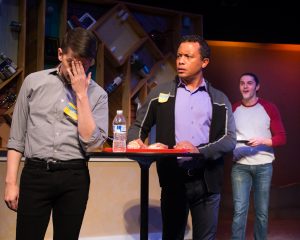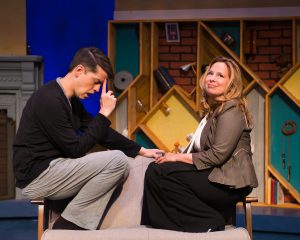THE BOYS IN THE BLAND
“Every day a little death/In the parlor, in the bed.” Thus spake Stephen Sondheim in his waltz time operetta A Little Night Music. And it is not totally frivolous to start a conversation about Mark Gerrard’s interestingly fresh oddball comedy, Steve, with a musical comedy reference since it is about a group of gay men (and their close friend, a cancer-riddled lesbian) who seem more at home singing show tunes than dealing with the human messiness of their lives, as well as such universal matters as death and growing old. What is frivolous is that director Becca Wolff and her actors are quite willing to skip along the water’s edge without ever taking a plunge into the ocean’s darker and deeper currents.
 Gerard understands, as Noël Coward did, the power of cheap music. And beneath the witty banter, he is writing about mature middle-aged men trying to grapple with a gay culture very different from the one they once knew. That, in itself, brings the play closer to our own times than earlier plays by Mart Crowley and Terrence McNally which must surely have influenced Gerrard.
Gerard understands, as Noël Coward did, the power of cheap music. And beneath the witty banter, he is writing about mature middle-aged men trying to grapple with a gay culture very different from the one they once knew. That, in itself, brings the play closer to our own times than earlier plays by Mart Crowley and Terrence McNally which must surely have influenced Gerrard.
What goes awry in NCTC’s production is that the actors seem too young for their parts, and not differentiated enough. And there is not a whiff of New York about them, and without that, then the pastel beach of the last scene can’t possibly be The Pines of Fire Island. And it is all played on one note and rarely rises above camp. The banter is spoken so rapidly that there is not enough time to get the laughs much of the banter earns. And yet, peculiarly enough, each scene ends not with the snap of a whip but with a kind of slow trailing off that deadens the impact. So pacing is a problem — too fast when it talks, too slow when it is not talking.
The two central characters, Steven and Stephen (one of the central jokes is that, in addition to these two, there is an unseen trainer named Steve, an Argentinian waiter named Esteban, and the elephant in the room, Stephen Sondheim), are raising a child who they talk about incessantly; now, we don’t have to see the child but we certainly have to believe these men have a child — that emotional connection is never really made. A potentially hilarious scene has Stephen juggling phone conversations with his mother and Steven’s mother while, visible on the screen, the sex texts that the characters are indulging in get raunchier as the scene progresses, but instead of hilarity, we get only confusion and a stubborn refusal to recognize the pathos when the past and the present cross each other.
There is one delicious political statement when Esteban tells the play’s five characters, all of whom simply adore Evita, that not everyone in Argentina loves Eva Perón. But even that joke gets thrown away. If you want to see a community theater production that doesn’t completely hide the play’s virtues, then Steve may be the vodka stinger you are looking for, but it never soars or even gets to the level the play reaches for and deserves. “You’re always sorry, you’re always grateful, you’re always wondering what might have been.”
photos by Lois Tema
Steve
New Conservatory Theatre Center
25 Van Ness Ave @ Market
ends on March 31, 2019
for tickets, call 415.861.8972 or visit NCTC








